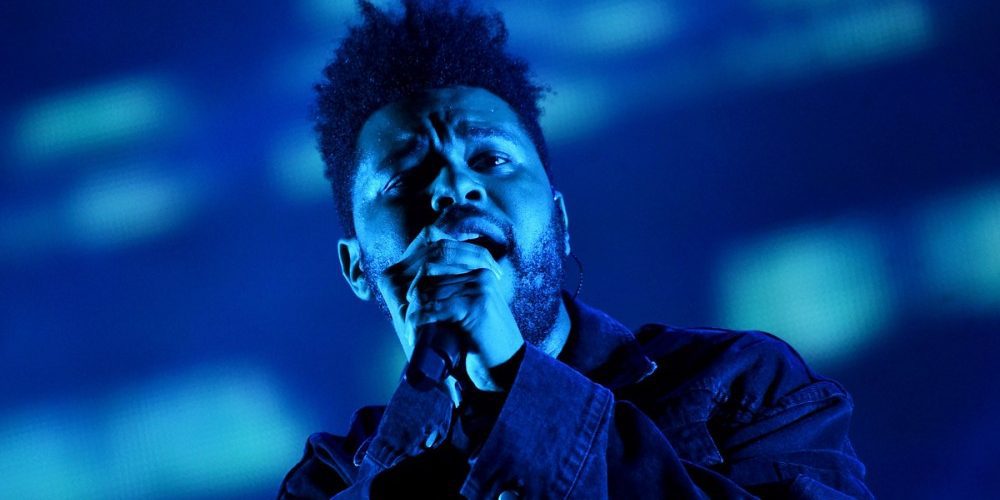We Really Could’ve Used The Old Weeknd Right Now
Now more than ever did we need an isolation album from Abel Tesfaye. The Weeknd’s new fourth studio album, After Hours, which went ahead with its ill-timed March 20 release in the middle of a pandemic, is appeasing sometimes, but it’s not the mood we’re currently craving. Where are the haunting singles we’re compelled to revisit again and again? Breakup after breakup with one of the hottest models in the world, but no real gut-wrenching content or harsh truths gained from it? If she didn’t destroy you, Abel, what was even the point? Emotions are high. Another new emo Weeknd album to have to get enveloped in amid the stress would’ve benefited this climate.
A few uncut gems (and I mean gems!) from his past were sprinkled throughout the After Hours rollout, but Abel’s mood board has otherwise stayed on theme: cinematic and smoky, a retro Sin City vibe the 30-year-old cinephile craves. Abel gets roughed up during his Vegas shenanigans in the video for “Blinding Lights.” He winds up with a bloodied bandage on his nose, dried up and scabby — the state of his career, if he’s not careful. It’s possibly a reference to his 2015 arrest for punching a cop in Vegas, or it’s just a faded analogy. Either way, After Hours is tired, and certainly trying way too hard to be wired. Abel did some cool tricks on late-night, and showcased his love for cinema in his short film. In it, he’s manic, does The Bold Type subway scream? (maybe it’s something about Canadians), has a panic attack, and kills people in an elevator. Through all this, he stays at arms-length from the actual blinding spotlight. No matter how hard Abel tries to be a flashy pop star, he will always favor being a recluse.
Meanwhile, as Abel opts for his “party boy” persona, Vegas is shutting down. The lights couldn’t be less blinding, and the hangover looks pitiful in the wake of the virus. And a synthy upper like “Heartless” won’t cure us. You know what hopefully will? Sequestering. Isolation. Introversion — all things he once excelled at. At a time when we’re being strongly advised, and in many cases mandated, to stay inside, I’m scrolling back to early Abel, the one overflowing with interior drama. I’m craving to once again be entrenched in the hazy numbness he produces so well. I want to feel jittery about doing bad things again, but let the angst be enough to feed the allure. I want to be punched in the gut by music, seeking tranquility and paralyzation and having absolutely no way to escape. Yes, the quarantine is that overwhelming.
The Canadian was once known for lows that scraped the pit so deep, you worried if he could claw his way back up to the top. People, especially those online, liked his vibration of being sad and feeling bad. It was a different kind of celebration. It didn’t have the temporary highs of the sunset strip — or the germ-filled slot machines or the addictive, unsustainable features of a casino — but it did have depth. He gifted us unhinged anthems like “High For This,” “Coming Down,” and “The Morning,” all off his 2011 breakthrough mixtape House of Balloons, and “Live For” from 2013’s Kiss Land. He reluctantly waded into mainstream R&B with 2015’s Beauty Behind the Madness, producing dark bangers “Often,” “The Hills” and “Earned It,” and moving up in the pop ranks with the commercial hit, “I Can’t Feel My Face.”
Now, in Abel’s latest, we get a mere glimpse into his upbringing in the soft “Snowchild,” and an astounding postlude in “Faith,” following an overall disappointing track. There’s a brutally honest song that chronicles his fraught relationship with L.A., their models, and fucking in the studio that’s of course titled “Escape From LA” (“Well this place is never what it seems / Take me out, L.A. / … This place will be the end of me”). We get a glistening jazz ending to “In Your Eyes.” These are the best of the album but it takes so long to get there, you might give up first.
In Uncut Gems the Safdie brothers used The Weeknd as a vehicle for the year 2012. Then, Abel was up and coming, still vibing with his Basquiat updo, quietly leading women like Julia Fox into a club closet, and then making a large fuss. It’s a heightened version of reality, but it’s who The Weeknd was. Now, we have a sexy stache, bizarre sunglasses, and lots of … suits? We have a Starboy with no real identity. We have pop boy junk like “Save Your Tears.” What does it say about The Weeknd brand, that the most genuine version of “The Weeknd” we were served recently was one produced by a film?
